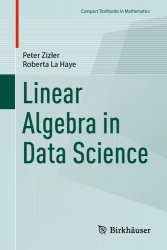Linear Algebra in Data Science
- Добавил: literator
- Дата: 16-05-2024, 16:12
- Комментариев: 0
 Название: Linear Algebra in Data Science
Название: Linear Algebra in Data ScienceАвтор: Peter Zizler, Roberta La Haye
Издательство: Birkhäuser/Springer
Год: 2024
Страниц: 202
Язык: английский
Формат: pdf (true), epub
Размер: 16.3 MB
Data Science is an exciting, emerging research area in the forthcoming digital age. It draws from a multitude of disciplines. We intend to show the reader the fundamental role of linear algebra in Data Science. This book showcases various Data Science topics as seen through the lens of linear algebra. This textbook explores applications of linear algebra in Data Science at an introductory level, showing readers how the two are deeply connected. The authors accomplish this by offering exercises that escalate in complexity, many of which incorporate MATLAB. Practice projects appear as well for students to better understand the real-world applications of the material covered in a standard linear algebra course. Some topics covered include singular value decomposition, convolution, frequency filtering, and neural networks. Linear Algebra in Data Science is suitable as a supplement to a standard linear algebra course.
This book evolved from lecture notes for a second year university course in applications of linear algebra. We have deliberately tried to maintain that flavor in this book. We emphasize understanding over rigor and don’t espouse the Theorem and Proof style of text. We also encourage students to use technology as much as possible for solving applications. The text examples are usually solved using technology, with answers rounded to the appropriate number of decimals.
We assume the reader is either familiar with foundational results in linear algebra or willing to consult a linear algebra text of their choice for specific results as they read our text. Readers with the basic linear algebra knowledge and who are interested in Data Science courses will find our text useful. Linear algebra is a pillar for Data Science, and understanding this will enable the student to grasp the procedures and techniques used. It will also provide the student with the ability to go further into the Data Science paradigm.
We start our exposition by briefly contemplating the rationale behind various basic matrix operations. We follow that with the fundamental linear algebra idea of projections and their under-appreciated applications in statistics. This is followed by a presentation on matrix algebra. Following these developments, we dive into various topics where linear algebra is a foundation, topics such as singular value decomposition of a matrix, the Haar transform, frequency filtering, and neural networks. We encourage the reader to review the concepts of a vector space, linear operator, matrices, and other relevant concepts from linear algebra. The reader can refer to the Appendix in our text to help to refresh the key topics.
Our text was written with the understanding that the reader has the desire to explore the linear algebra foundations in Data Science. The exposition in our text can be seen both as an invitation to explore the topic presented as well as a challenge to see deeper connections between linear algebra and Data Science. This is manifested by our choice of exercises, where basic rudimentary exercises with computational nature are blended with challenging ones, some with new approaches. Moreover, the interested reader will also find practice projects that one could find in real life settings.
Machine Learning and neural networks are relatively recent topics, propelled by the digital revolution and advances in computing ability. The main idea might seem simple: learn from data, update weights in neuron layers, and predict using weighted sums. The more one studies this topic, the more one realizes how deep and intricate the subject is. Questions such as how to update the weights, how many hidden layers to implement, and what input data to use are just a few crucial questions needed to be answered.
Contents:
Скачать Linear Algebra in Data Science
[related-news] [/related-news]
Внимание
Уважаемый посетитель, Вы зашли на сайт как незарегистрированный пользователь.
Мы рекомендуем Вам зарегистрироваться либо войти на сайт под своим именем.
Уважаемый посетитель, Вы зашли на сайт как незарегистрированный пользователь.
Мы рекомендуем Вам зарегистрироваться либо войти на сайт под своим именем.

